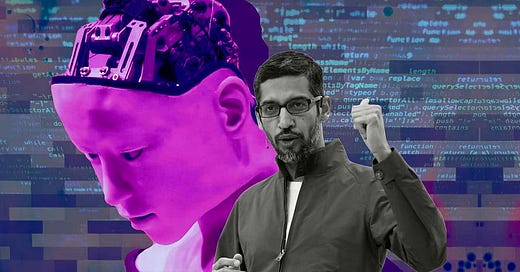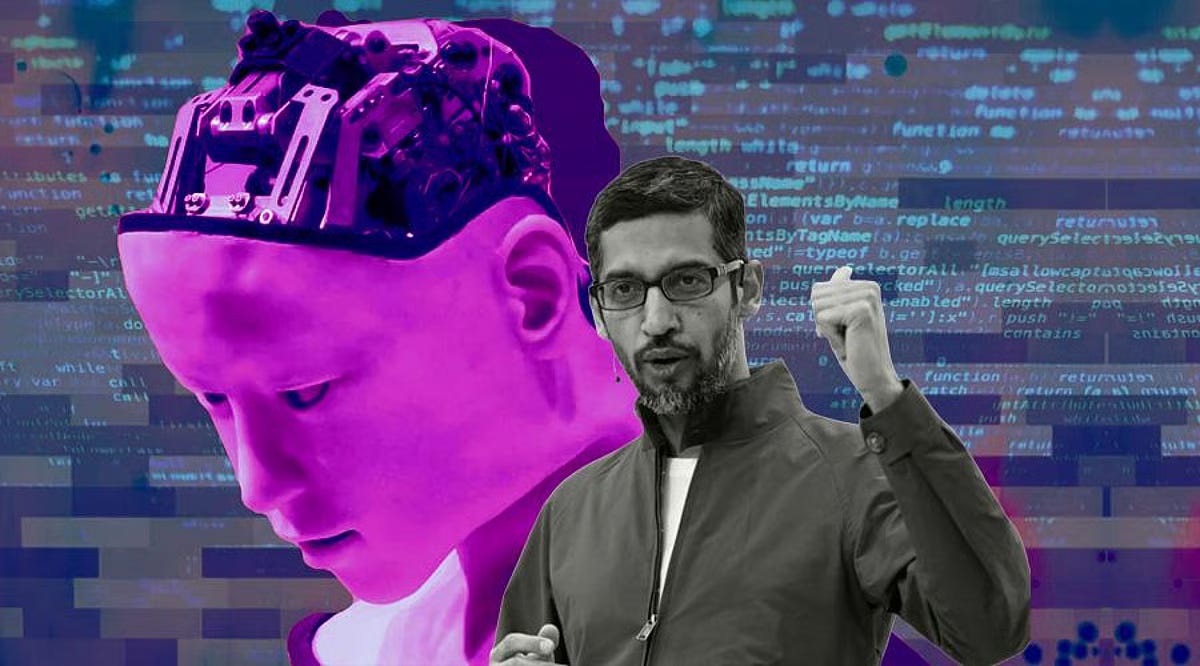First, I want to thank all of you for subscribing and going along this ride. It’s been incredible. If you would please consider upgrading your subscription, it would mean so much. Doing so helps tremendously so that I can write more frequently and share my work with new readers. Plus, you can save over 20% by upgrading to an annual subscription! In addition, I’ll be working on some special content just for you. Warm thanks.
Hold your breath for a sec.
Very rapid progress is taking place in the realm of artificial intelligence. The conversation is moving from what's possible to what’s inevitable and how this will affect our everyday functions in society. Mark Zuckerberg, the CEO of Facebook, went on record to say “we are entering a world where we will learn to coexist with AI, not as its masters, but as its collaborators.”
Groan with me a collective eww.
What does it mean for Christians to live in a world where the intricate science fictionalization of The Matrix is… not that far from being real? How do we navigate and discern the implications of AI from a Biblical perspective as God’s People? Where do we draw the line on reclaiming the sanctity of our humanity? Below you’ll find articles and other resources I’ve picked up recently on the subject. I hope they leave you challenged and prayerful.
Not too long ago, Peco and Ruth Gaskovski over at School of the Unconformed published a great piece on the cognitive developmental threats of AI in our day:
The CEO of Google, Sundar Pichai, splits no hairs on the affect of artificial intelligence in regards to our humanity: “The future of AI is not about replacing humans, it’s about augmenting human capabilities.” Even worse, he continues: “As AI interactions come to feel more intuitive and human — they put us at the center of the experience. Technology begins to feel like a natural extension, augmenting human capability, bridging gaps in expertise and experience, and breaking down barriers like language and accessibility.”
Super creepy, yeah? The truth is Mankind needs only one augmentation, provided in the death and resurrection of Jesus Christ, with new humanity accessible by faith in His Name. Through the regenerative power of the Holy Spirit, we are made a new creation (2 Cor. 5:17), and we experience the process of sanctification (or “holy-making”) leading into our eternal glorification with Jesus.
2 Grace and peace be multiplied to you in the knowledge of God and of Jesus our Lord; 3 seeing that His divine power has granted to us everything pertaining to life and godliness, through the true knowledge of Him who called us by His own glory and excellence. 4 For by these He has granted to us His precious and magnificent promises, so that by them you may become partakers of the divine nature, having escaped the corruption that is in the world by lust.
— 2 Peter 1:2-4
No servomechanisms required.
Really thoughtful note from my wonderfully reflective brother Isaac Angel Meza:
Legendary nextgen pastor Terry Parkman on transmitting the Gospel to the next generation amidst the challenges of modern tech and AI:
Stop real quick. Have we ever considered the spiritual implications of artificial intelligence? What it even is and what tapping into it means for our souls? Next is a hauntingly interesting post from my good friend Andrew at TELOSITY:
This piece from Blaine Eldredge packs some incisive outlooks on what AI means for our humanity. One of my favorite parts:
Think of the automatic checkout line at the grocery store. The automatic checkout line does not view a machine as a better version of a person but as a preferable alternative to a person. Because if life is about getting what you want, wouldn’t you rather interact with entities who will only serve you? ChatGPT doesn’t care if 99% of your queries are immoral, and Deepfake apps won’t block your use when it is sinful. For the most part, they’ll do what you want.
This, friends, is not a positive human vision, in which other people are divine image bearers through whom we can render service to Christ.
Plus, there’s a catch: relationship is the way blessing is transmitted in God’s economy.
This fact stems from the Trinity, a God who exists as a community of self-offering love. God transmits blessing in His very nature through relationship, and He wants to transmit blessing to his creation through relationship.
But people often fail. And so the AI tools we’re getting represent a bid to get blessing without relationship.
Check out the full essay below:
Lastly, I’ll offer a fascinating conversation from Justin Brierley’s stupendous The Surprising Rebirth Of Belief In God podcast on robotics, bio-ethics and the looming movement of transhumanism:
Go outside. Embrace the surrounding nature God fashioned. Read a book. Buy someone an Americano and keep your phone on airplane mode while talking.
Check out this poem by Treyson from Eden Gate, with this stanza probably hitting me the hardest:
"do not cash in your embodiment for the pride of the busy schedule. the trophy of busyness is made of fool's gold. do less and be more."
May we all take hold of the things which digital tools can never offer us; every gift from the Father of lights (James 1:17). Let us learn our humanness from the Perfect Human — Christ Jesus — and follow Him into a rugged, felt, embodied life in the Spirit through the wilds of the world.











I feel like we got a pretty solid avengers team forming here 💪
“Buy someone an Americano and keep your phone on airplane mode while talking.”
This.